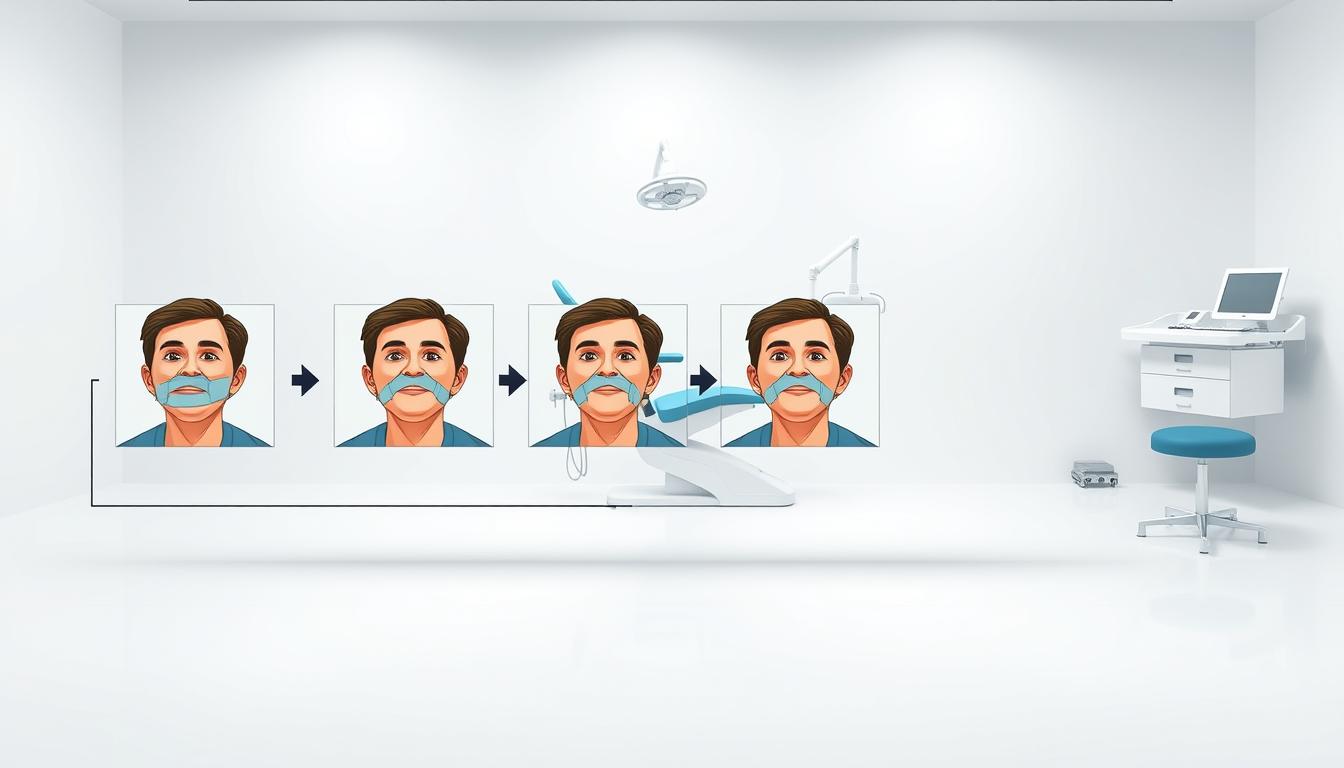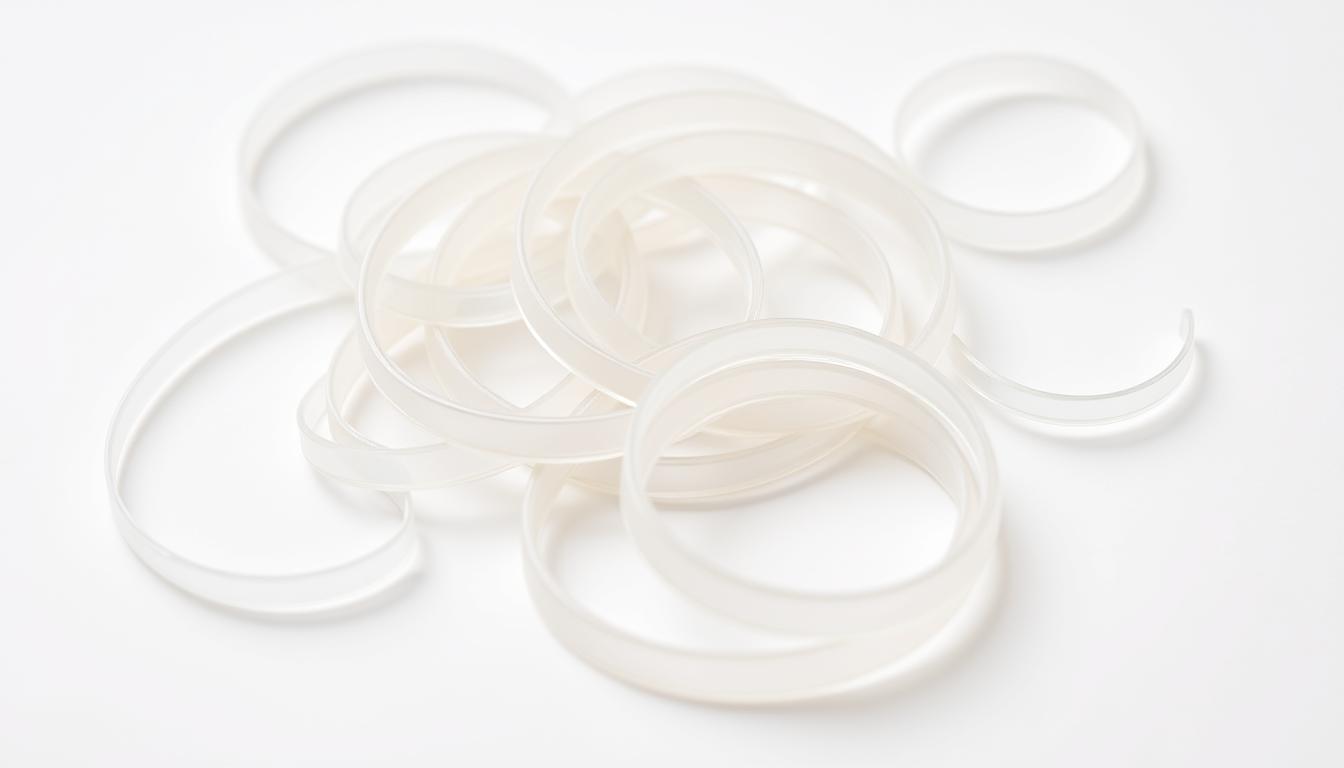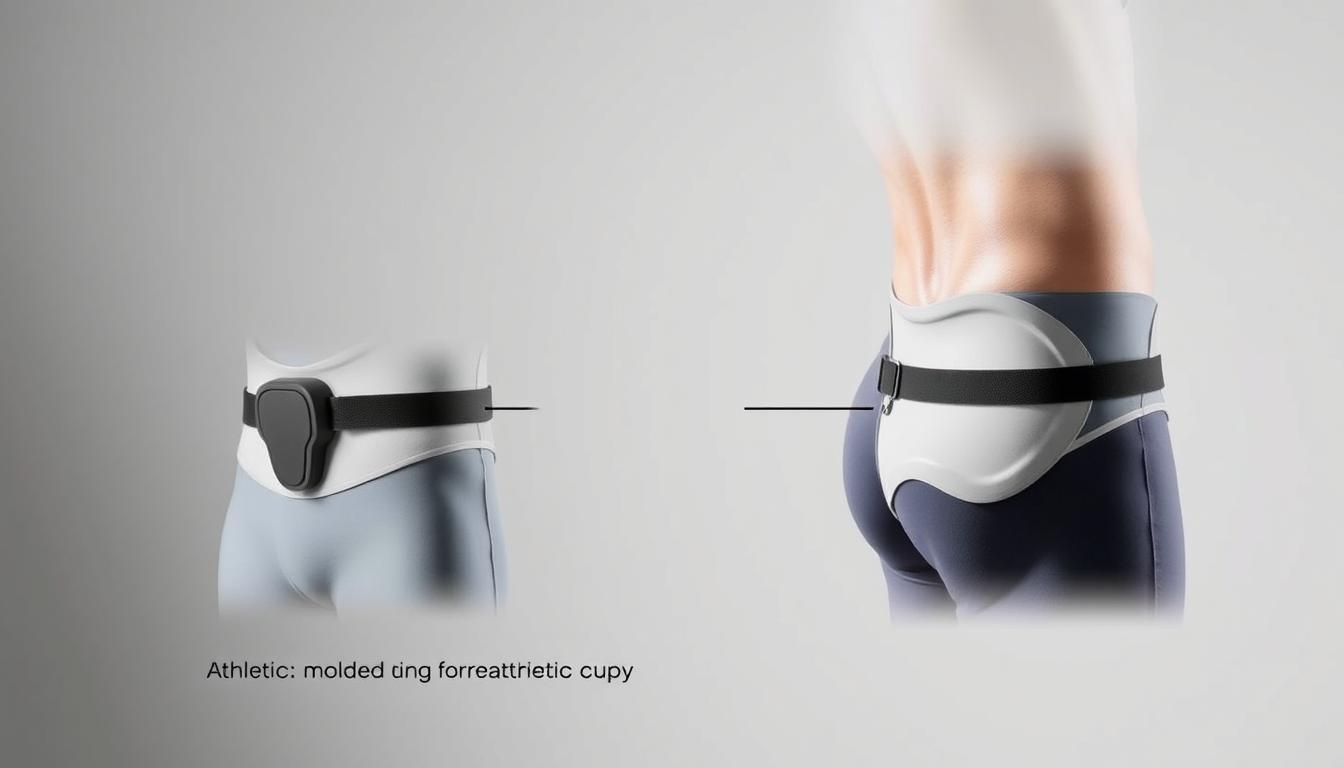Understanding how long dental anesthesia lasts can make your next dental visit easier. Whether it’s a simple filling or a more complex treatment, knowing the duration helps you plan. It lets you know what to expect and how to manage your day.
Dental anesthesia is key for pain relief during dental procedures. But, many wonder about the lingering numbness. The time it takes to wear off depends on the anesthetic type, your body’s chemistry, and the procedure.
Most people feel numb for 2 to 4 hours after dental work. This can affect eating, speaking, and getting back to normal. Knowing how long dental anesthesia lasts helps you prepare for a smooth recovery.
Key Takeaways
- Dental anesthesia typically lasts 2-4 hours
- Individual factors influence anesthetic duration
- Different procedures require varying anesthesia types
- Numbness gradually decreases after dental treatment
- Proper post-procedure care speeds recovery
Understanding Dental Anesthesia Basics
Dental anesthesia is key in today’s dental care, making sure patients are comfortable and pain-free. We dive into the science of numbing techniques used in dental treatments.
Dentists use different anesthetic methods to make dental visits painless. This turns what could be a stressful procedure into a calm and easy experience.
Types of Dental Anesthetics
- Local Anesthetics: Numbs specific areas of the mouth
- Topical Anesthetics: Surface-level numbing before injections
- Sedation Anesthesia: Reduces anxiety and provides relaxation
- General Anesthesia: Complete unconsciousness for complex procedures
How Dental Anesthesia Works in Your Body
The length of dental anesthesia depends on how it interacts with nerve signals. These drugs block pain receptors, stopping nerve impulses from reaching the brain. The body breaks down these anesthetics in ways that temporarily stop pain signals.
| Anesthetic Type | Typical Duration | Primary Use |
|---|---|---|
| Lidocaine | 1-2 hours | Minor dental procedures |
| Articaine | 2-3 hours | Complex dental work |
| Bupivacaine | 4-8 hours | Lengthy surgical procedures |
Common Applications in Dental Procedures
Dental anesthesia is used in many treatments, from simple fillings to complex root canals. Dentists choose the right anesthetic based on the procedure, patient health, and how long the numbness will last.
- Cavity treatments
- Tooth extractions
- Root canal therapy
- Dental implant surgeries
How Long Does It Take for Dental Anesthesia to Wear Off
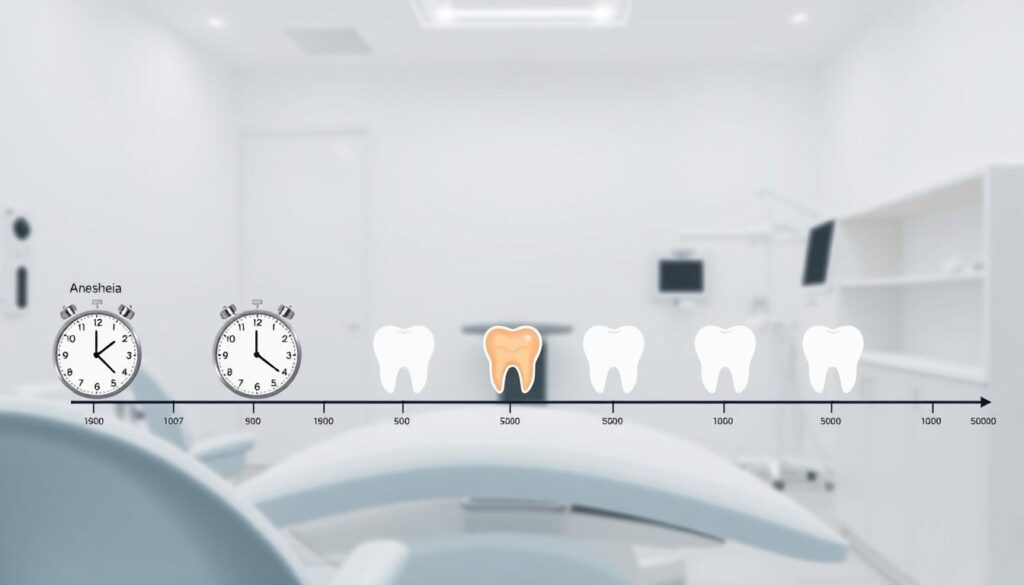
Knowing how long dental anesthesia lasts is key for those getting ready for dental work. The time it takes for the numbness to fade can vary. This depends on several important factors that affect your recovery.
Dental anesthesia usually fades in 2-4 hours after your visit. The type of local anesthetic used can change how long you stay numb:
- Lidocaine: About 1-2 hours of numbness
- Articaine: Up to 3-4 hours of dental numbing duration
- Bupivacaine: Can last 6-8 hours for extra numbness
Many wonder how long it takes for dental anesthesia to fully wear off. The feeling comes back slowly, starting with tingling and ending with full sensitivity. Your body’s metabolism, where the shot was given, and the type of anesthetic all affect how fast you recover.
Some might feel numb longer because of:
- Slower metabolic rates
- More complex dental work
- Higher doses of anesthetic
While waiting for the numbness to go away, it’s best to avoid eating, drinking hot liquids, or doing anything that needs precise mouth movements. This helps prevent accidents.
Factors Affecting Dental Anesthetic Duration
Dental anesthesia doesn’t affect everyone the same way. Many things can change how long the numbness lasts after a dental visit. Knowing these can help you get ready and handle your recovery better.
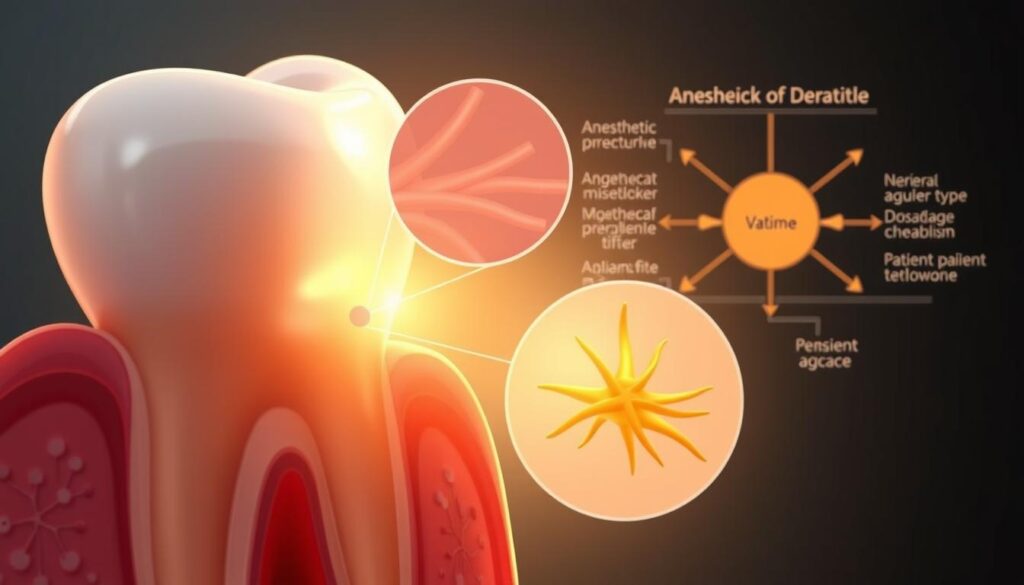
Your body’s own traits greatly affect how long dental sedation lasts. Several important factors decide how long you’ll stay numb after a dental treatment.
Individual Patient Characteristics
Every person’s body reacts differently to dental anesthesia. Important personal factors include:
- Metabolism rate
- Body weight
- Age
- Overall health condition
- Genetic predispositions
Type and Strength of Anesthetic Used
The anesthetic your dentist picks affects how long the numbness lasts. Different drugs are absorbed and broken down at different rates.
| Anesthetic Type | Average Duration | Typical Use |
|---|---|---|
| Lidocaine | 1-2 hours | Short procedures |
| Articaine | 2-3 hours | Complex dental work |
| Bupivacaine | 4-8 hours | Longer surgical interventions |
Location of Injection
Where the anesthetic is given also matters. Different parts of the mouth break down anesthetics at different rates.
- Lower jaw injections usually last longer
- Upper jaw areas tend to have shorter numbing periods
- Nerve proximity impacts anesthetic absorption
Understanding these factors helps patients know what to expect after dental work. It makes managing recovery easier.
Timeline of Dental Numbing Duration by Procedure
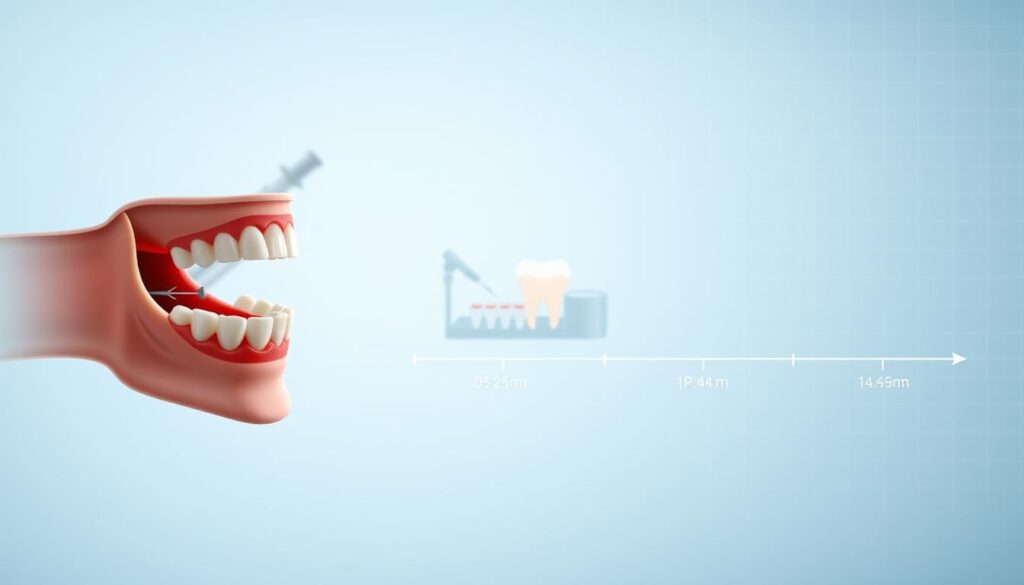
Knowing how long dental numbing lasts is key to planning your day after a dental visit. Different treatments need different times for the numbing to wear off. This can affect what you can do after your appointment.
Here’s a look at how long numbing usually lasts for common dental procedures:
- Dental Fillings: The numbing effect usually lasts 1-3 hours after the procedure. You might start to feel numb again within the first hour.
- Root Canal Treatment: This can take 3-5 hours to wear off because of the procedure’s complexity and the deeper anesthetic used.
- Tooth Extraction: You can expect numbness to last 2-4 hours, depending on how complex the extraction was.
- Wisdom Tooth Removal: This more complex procedure might keep you numb for up to 5-8 hours.
Things like how fast you metabolize the anesthetic, the type of anesthetic, and where it was injected can affect how long you stay numb. Some people might feel numb for less time, while others might feel it longer.
Pro tip: Always plan your day with the possibility of longer numbness in mind, more so for complex dental procedures.
Signs That Dental Anesthesia Is Wearing Off
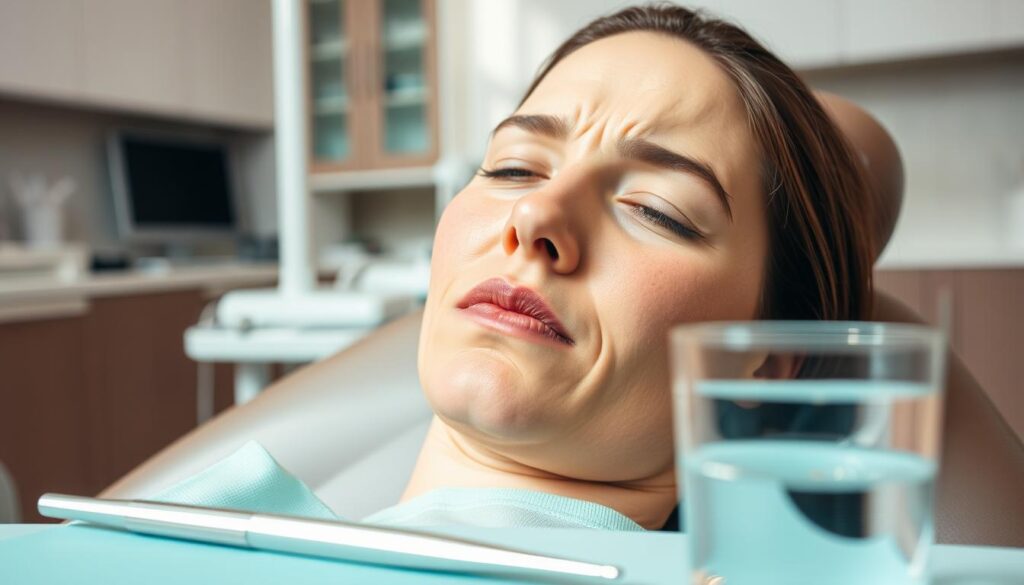
Understanding dental anesthesia effects helps you feel more confident during recovery. As the anesthesia fades, your body will send signals that your mouth is feeling sensations again.
It’s important to know the signs of dental anesthesia wearing off. Everyone recovers differently, based on their body and the procedure done.
Physical Sensations During Recovery
When dental anesthesia fades, you’ll notice several sensations:
- Tingling Feeling: A mild pins-and-needles sensation in your lips, cheeks, or tongue
- Gradual Warmth: Slow return of temperature sensitivity in the treated area
- Partial Numbness: Decreasing numbness that starts at the edges of the treated region
Normal vs. Abnormal Recovery Symptoms
Most people follow a predictable recovery path. But, it’s key to know the difference between normal and concerning symptoms:
- Normal Symptoms:
- Gradual return of sensation
- Mild discomfort
- Slight sensitivity
- Abnormal Symptoms (Requires Dental Consultation):
- Prolonged numbness beyond expected timeframe
- Severe pain
- Unusual swelling
Dental anesthesia effects usually fade in a few hours. But, everyone’s experience is different. Pay attention to your body’s signals. If you have concerns, reach out to your dentist.
Managing Daily Activities While Anesthesia Wears Off

Life after a dental procedure can be tough when the anesthesia wears off. Your mouth might feel numb, making everyday tasks hard. We’ve got some tips to help you get through this time.
Here are some important things to do during dental anesthesia recovery:
- Avoid hot beverages that could burn your numb mouth
- Eat soft, cool foods to prevent accidental biting
- Use a straw carefully to prevent spilling
- Speak slowly and carefully to avoid biting your cheek
Pro tip: Keep ice packs nearby to manage any swelling and discomfort during dental anesthesia recovery time.
Talking might be a bit tricky when the sedation is wearing off. Let people know you’re a bit numb. If you have big meetings or calls, think about rescheduling or using written notes.
Working from home or staying productive? Make your space comfy. Set up your desk with things you can easily reach. And remember, rest is key during this time.
- Use text messages instead of phone calls
- Have soft foods and water nearby
- Take breaks if feeling uncomfortable
- Be patient with yourself during recovery
Your body needs time to get back to normal after dental work. See this time as a chance to relax and heal. The numbness will go away soon.
Tips for Speeding Up Anesthesia Recovery Time
After a dental procedure, many patients want to recover faster. They aim to speed up the dental anesthetic fading process. Here are some expert tips to help you feel normal again sooner and more comfortably.
Your body naturally breaks down dental anesthetics. But, you can help this process with some smart steps. The main thing is to be gentle with yourself and follow these tips.
Safe Methods to Enhance Recovery
- Stay warm and move around gently to improve blood circulation
- Drink room temperature water to help metabolize the anesthetic
- Perform light facial exercises to stimulate nerve endings
- Rest in an upright position to promote faster dental anesthetic fading
Activities to Avoid During Recovery
Some actions can slow down your recovery and cause discomfort. Be careful with the following:
- Avoid extreme temperatures (very hot or cold drinks)
- Do not bite or chew the numb areas of your mouth
- Skip intense physical activities immediately after the procedure
- Refrain from touching or massaging the treated area
Pro tip: Patience is key during dental anesthetic recovery. Your body will naturally process the anesthesia. So, don’t worry if sensation returns slowly.
Potential Side Effects of Dental Anesthesia
Dental anesthesia is key for many dental treatments. Knowing its side effects can make patients feel more ready. While most experiences are smooth, some might face unexpected reactions.
The side effects of dental anesthesia can range from mild to serious. Here are common effects patients might see:
- Temporary numbness in the mouth, lips, and tongue
- Slight facial drooping or muscle weakness
- Dizziness or light-headedness
- Minor bruising at the injection site
But, there are rare and serious side effects too:
- Allergic reactions
- Increased heart rate
- Temporary nerve damage
- Prolonged numbness
People with certain health issues or allergies should talk to their dentist first. Knowing these effects can make you feel more at ease during your visit.
If you have ongoing or severe side effects, reach out to your dentist right away. They can offer help and support.
When to Contact Your Dentist During Recovery
Recovering from dental anesthesia can be tough. You might wonder when to call your dentist after a procedure. Knowing when dental sedation wears off helps you feel more confident during recovery.
After dental work, it’s important to watch for certain symptoms. Some signs need quick help from a dentist. Most side effects are mild, but some are serious.
Emergency Warning Signs
Some symptoms mean you need to see a doctor fast:
- Excessive bleeding that doesn’t stop after 24 hours
- Severe pain that doesn’t get better with medicine
- Signs of infection like high fever or big swelling
- Prolonged numbness that lasts more than 24 hours
- Allergic reactions like intense itching or trouble breathing
Normal Recovery Concerns
Not all feelings after dental work are serious. Many are just part of getting better:
- Mild discomfort at the injection site
- Temporary sensitivity when eating or drinking
- Slight bruising near the procedure area
- Gradual return of feeling in treated areas
If you’re unsure about any symptoms, call your dentist. They can give advice based on your procedure and health history.
Special Considerations for Different Age Groups
Dental anesthesia works differently for people of all ages. Knowing how it affects each group helps patients get ready for dental visits.
Children and adults react to dental anesthesia in unique ways. Kids have smaller bodies and faster metabolisms, so anesthesia wears off quicker. But, they need special care to handle anxiety and pain.
- Younger patients (under 12) often metabolize anesthetics faster
- Children may need additional emotional support during recovery
- Pediatric dentists use lower-dose anesthetics tailored to body weight
Adults in their prime see moderate effects from dental anesthesia. Health, medications, and metabolism affect how long anesthesia lasts. Middle-aged people might take a bit longer to recover than younger folks.
Seniors need extra care during dental visits. Dental anesthesia can hit them harder because of health issues that come with age. Slower metabolism and drug interactions can make numbness and recovery longer.
- Older adults may experience extended dental anesthesia duration
- Comprehensive medical history review is essential
- Gentle monitoring during and after dental procedures is recommended
Every patient, no matter their age, should talk openly with their dentist. Share health concerns and worries about anesthesia effects.
Post-Procedure Care and Recovery Guidelines
After your dental procedure, it’s important to take good care of your mouth. This helps your healing and keeps you comfortable. You’ll need to follow some special steps to make sure you recover well.
Recovery begins as soon as you leave the dentist’s office. We’ve put together a detailed guide to help you through the healing process. It will give you the confidence you need.
- Manage initial swelling with cold compresses for the first 24 hours
- Avoid hot foods and drinks while numbness persists
- Stick to soft, cool foods during initial recovery
- Maintain gentle oral hygiene to prevent infection
Pro tip: The time it takes for the numbness to wear off can vary. Usually, it takes 3-5 hours for full sensation to return.
What you eat is also important for your recovery. Start with liquids and soft foods. Then, slowly add more solid foods as you can feel them again. Be careful not to bite your numb side.
- First 2 hours: Liquids only
- 2-4 hours: Soft, cool foods
- 4-6 hours: Gradually return to normal diet
Listen to your body. If you have any unusual symptoms that last longer than expected, call your dentist. They can offer the help you need.
Myths and Facts About Dental Anesthesia Duration
Dental anesthesia can be a mystery for many. Knowing how long dental anesthesia lasts can ease anxiety and set clear expectations for dental visits.
Let’s look at some common myths about dental anesthesia and find out what’s true:
- Myth: Drinking hot beverages speeds up anesthesia recovery
Reality: This can actually cause accidental burns and does not impact anesthetic duration.
- Myth: Moving your mouth frequently helps numbness disappear faster
Reality: Physical movement does not significantly reduce dental local anesthetic duration.
- Myth: All dental anesthetics wear off at the same rate
Reality: Different anesthetic types have varying recovery times based on individual factors.
To help clarify, we’ve compiled a quick reference for dental anesthesia myths:
| Myth | Fact |
|---|---|
| Alcohol speeds recovery | Alcohol can interfere with healing and does not reduce numbness |
| Numbness feels the same for everyone | Recovery time varies based on individual metabolism and anesthetic type |
| You can predict exact recovery time | Recovery is influenced by multiple personal and procedural factors |
Understanding these myths can help patients feel more confident and have realistic expectations about dental anesthesia duration.
Conclusion
Understanding dental anesthesia duration can seem like a puzzle. We’ve looked into how long it takes for dental anesthesia to wear off. We’ve covered the main factors that affect your recovery time.
The time it takes for dental anesthesia to wear off changes based on several things. These include the type of procedure, your body’s response, and the anesthetic used. Now, you know what to expect at your next dental visit.
Your dental health is like picking out the perfect outfit. Knowing how long dental anesthesia lasts helps you plan your recovery. Always listen to your dentist and watch how your body feels.
With this knowledge, you’re ready for dental procedures with confidence. Your smile is your best accessory. Now, you know how to keep it bright through every dental visit.

